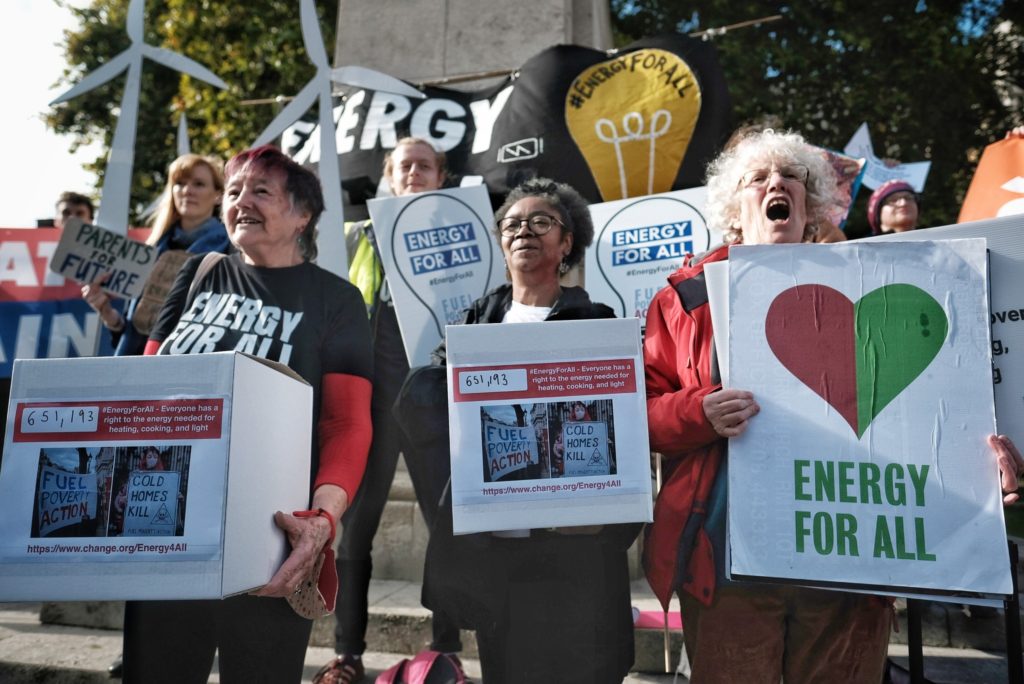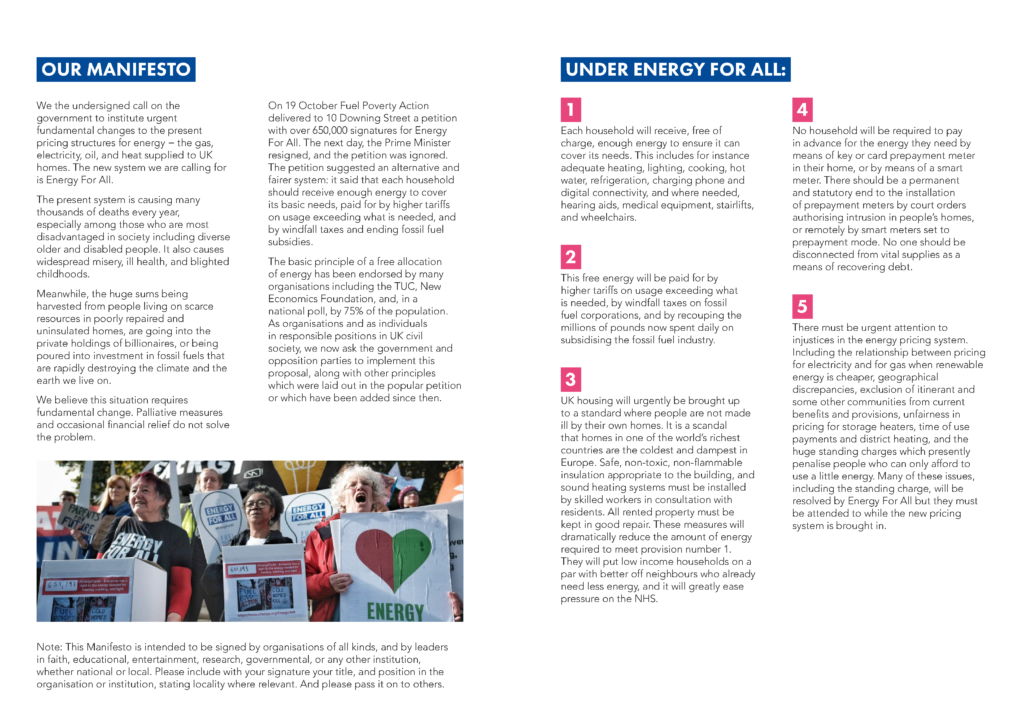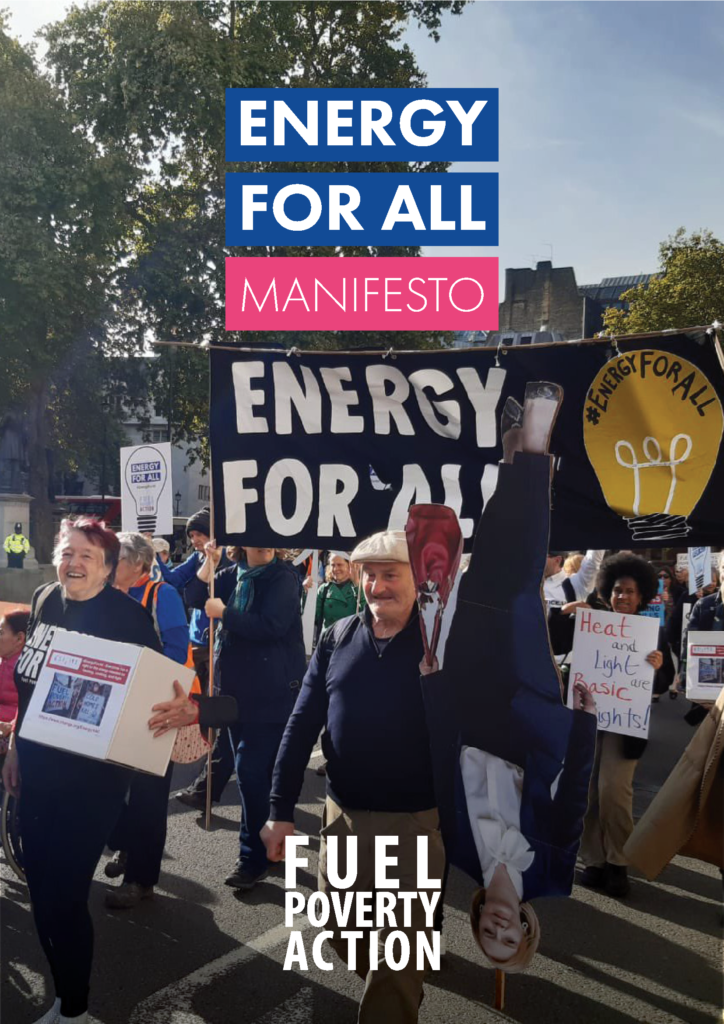Visit our new Energy for All website by clicking the logo below or heading to energyforall.org.uk


Press Release – On Wednesday 19 October 2022, our Energy For All petition was handed in to 10 Downing St . At the time of the event, signatures numbered 651,193! Over 100 people gathered in support for a rally and march in Westminster and to hear speakers from a range of allied movements. Also in attendance, were over 20 MPs from multiple parties. The day prior to the petition hand-in, an Early Day Motion launched in parliament calling for a Universal basic energy allowance. Email your MP asking them to sign!
Sign up for campaign updates. Contact us – [email protected].
We call on the government to institute urgent fundamental changes to the present pricing structures for energy – the gas, electricity, oil, and heat supplied to UK homes. The new system we are calling for is Energy For All.
The present system is causing many thousands of deaths every year, especially among people who are vulnerable due to their age or disabilities. It is also the source of widespread misery, ill health, and blighted childhoods.
At the same time, the huge sums being harvested from people living on scarce resources in poorly repaired and uninsulated homes, are going into the private holdings of billionaires, or being poured into investment in fossil fuels that are rapidly destroying the climate and the earth we live on.
We believe this situation requires not palliative measures and occasional financial relief, but fundamental change.
The basic principle of a free allocation of energy has been endorsed by many organisations including the TUC, New Economics Foundation, and, in a national poll, by 75% of the population. As organisations and as individuals in responsible positions in UK civil society, we now ask the government and opposition parties to implement this proposal, along with other principles which were laid out in the popular petition or which have been added since then.
Under Energy For All:
- Each household will receive, free of charge, enough energy to ensure it can cover its needs. This includes for instance adequate heating, lighting, cooking, hot water, refrigeration, charging phone and digital connectivity, and where needed, hearing aids, medical equipment, stairlifts, and wheelchairs.
- This free energy will be paid for by higher tariffs on usage exceeding what is needed, by windfall taxes on fossil fuel corporations, and by recouping the millions of pounds now spent daily on subsidising the fossil fuel industry.
- UK housing will urgently be brought up to a standard where people are not made ill by their own homes. It is a scandal that homes in one of the world’s richest countries are the coldest and dampest in Europe. Safe, non-toxic, non-flammable insulation appropriate to the building, and sound heating systems must be installed by skilled workers in consultation with residents. All rented property must be kept in good repair. These measures will dramatically reduce the amount of energy required to meet provision number 1. They will put low income households on a par with better off neighbours who already need less energy, and it will greatly ease pressure on the NHS.
- No household will be required to pay in advance for the energy they need by means of key or card prepayment meter in their home, or by means of a smart meter. There should be a permanent and statutory end to the installation of prepayment meters by court orders authorising intrusion in people’s homes, or remotely by smart meters set to prepayment mode. No one should be disconnected from vital supplies as a means of recovering debt.
- There must be urgent attention to injustices in the energy pricing system. Including the relationship between pricing for electricity and for gas when renewable energy is cheaper, geographical discrepancies, exclusion of itinerant and some other communities from current benefits and provisions, unfairness in pricing for storage heaters, time of use payments and district heating, and the huge standing charges which presently penalise people who can only afford to use a little energy. Many of these issues, including the standing charge, will be resolved by Energy For All but they must be attended to while the new pricing system is brought in.
Media Coverage on Energy For All
Full round-up of coverage for Warm-Ups on 03.12.22 calling for Energy For All
Warm-Ups took place at Scottish Power HQ in Glasgow, the British Museum, Harrods, a Barclays Bank in Hastings and shopping centres in Brighton, Bristol, Liverpool, Oxford and Stratford.
Ruth London appears on the Evening Standard’s ‘The Leader’ Podcast
Ruth discusses BP’s record profits, our Energy For All campaign, unjust standing charges and why we’re backing the Don’t Pay campaign. Listen from 8 mins 20 seconds in to hear Ruth’s interview. 2 August 2022
Energy Live News: ‘Ofgem urged to abandon plans to introduce a quarterly price cap‘
Ruth London from Fuel Poverty Action said: “Ofgem has supported higher charges for people on prepayment meters and has added to the burden of the standing charge element of bills. Both force people on low incomes to pay for energy at much higher rates than the wealthy. The current crisis makes it urgent to reverse this grotesque injustice and bring in energy for all – a free band of energy to make sure that everyone can keep warm and keep the lights on.” 16 June 2022
Ruth London explains how Energy For All could work in The Guardian: ‘Fuel Poverty Action’s energy pricing plan is not just for the poorest‘ 25 April 2022
In Scotland, the Herald editorialises: ‘Urgent action is needed on our energy bills’
“The Fuel Poverty Action group has devised an interesting scheme whereby everyone will receive a free amount of energy to cover such basics as heating, cooking and lighting, with the pricing system being funded by a windfall tax on the profits of oil and gas producers, traders and suppliers … Something, surely, has to happen.” 23 April 2022
Award-winning journalist Polly Toynbee endorses our Energy For All campaign in a major online comment piece: ‘People are struggling to pay their energy bills – here’s a simple idea that could help‘ 21 April 2022
Resources on Energy For All
Read our Energy For All briefing produced for a parliamentary event on 15 June 2022: A roundtable: building a movement around the Cost of Living Crisis hosted by Nadia Whittome MP
Alexa Waud introduces Energy For All in the context of debates around universality and ‘vulnerability’ at the Right to Energy Forum, December 2020. The ensuing discussion raised important questions about Energy For All at the early stage of the proposal’s development.
A taster from Alexa’s speech: “Covid just made it obvious that what’s needed is not specific treatment for some but an energy system and a pricing system that are fit for everyone … So – we started looking at the whole thing from another angle. We’re now putting forward what we’re calling “Energy for All” … It’s more like a universal human right.”



